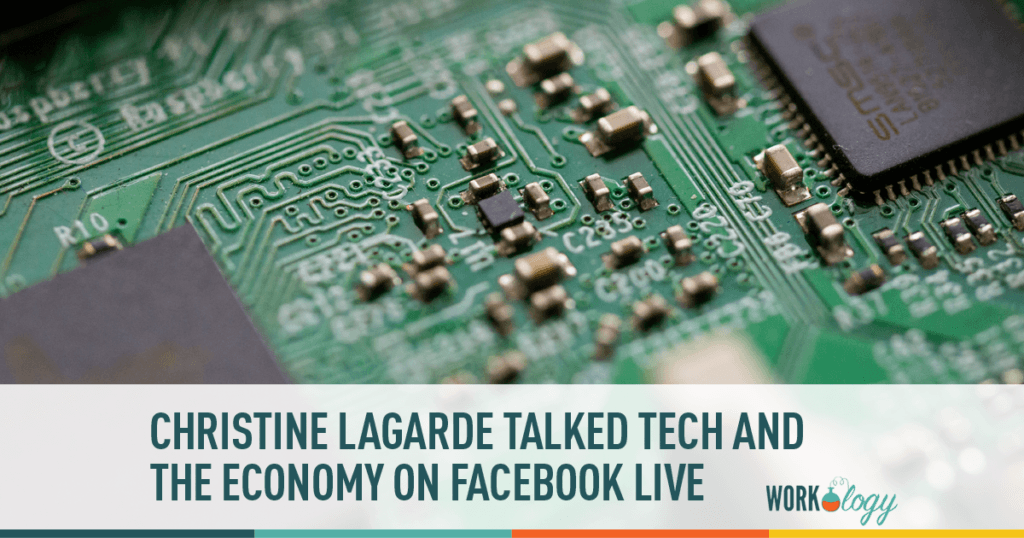Christine Lagarde, the IMF’s managing director, joined the Wall Street Journal today for a Facebook Live interview on the role of technology in the international economy. The interview was just the start of a big week for Legarde. The IMF will hold its annual meetings this week in Washington and will release its World Economic Outlook report tomorrow. Expect the relationship between technology, jobs and growth to be a big theme in the Outlook and in announcements coming out of the annual meetings.
Lagarde Talks Everything Tech and Economy
During the Q&A Lagarde was asked about everything from manufacturing to cryptocurrency but she stayed on brand, giving the kinds of answers we have come to expect from her.
Lagarde emphasized that technology has had both positive and negative effects on all sectors of the global economy: where it makes some jobs redundant, it makes other, new jobs necessary. And while the overall global economy remains weak and growth continues to be slow, technology is a “driving factor for innovation and improvement of productivity.” Should we fear the robot apocalypse? At least as far as the employment landscape, Lagarde says no. (She didn’t comment on potentially evil robots, but I guess I can’t have everything I hope for.) “A breakthrough in technology, a significant innovation, creates fear and anxiety, does eliminate jobs but by the same token, new jobs are created.” This, she said, is a longstanding pattern of technological development and while automation is now proceeding at a faster pace than ever before, it will follow this same pattern of disruption, growth and finally new order.
It should also, she said, drive investment, both private and public. Partnerships between public and private sectors will be important to ensuring that this change benefits more than just those at the top, and instead works for our economies as a whole. “Tech gurus estimate that 66% of the jobs that people now in high school will have don’t yet exist,” she said. “The trick is how do we prepare them? How do we retrain those whose jobs will be eliminated by robots, to make sure that we don’t have more inequality and more disruption in the social contract.” Good economic policy is how we can keep the gap between the rich and the poor from growing and how we can ensure that global economies are growing both profits and jobs — that is, that they’re truly productive.
She spent time too, on protectionist economic policies, which have become increasingly en vogue in America, Europe and elsewhere. Advocates of Brexit in the UK and conservative politicians in Europe and the United States have been moving away from globalism towards protectionism — think Donald Trump’s campaign promises to renegotiate or leave several international trade deals and multilateral defence pacts. For Lagarde, this protectionist fad is understandable, given current economic struggles, but dangerous. During a September talk in Chicago, she called trade restrictions “economic malpractice,” bad policies that can lead only to slow the growth of wages, hiring and the global economy overall. She went on to say that
“For the past several years, the global recovery has been weak and fragile, and this continues to be the case today. Especially for advanced economies – while there are some good signs – the overall growth outlook still remains subdued. We continue to face the problem of global growth being too low for too long, benefiting too few.
Rising economic inequality is a phenomenon in many countries today, rich and poor, but it has really hit home in the advanced world right now, where real incomes for many have been declining – or growing at a much slower rate – and past economic achievements seem at risk.”
In recent decades there has been less inequality between countries, she said in the Facebook Q&A, as developing countries close the gap, but protectionist trade policies work against this trend, which has had the effect of slowly reducing inequality even within countries.
There’s lots of food for thought in the 20-minute Q&A, which you can find here. Ponder that until we meet again later in the week to discuss the IMF’s World Economic Outlook dropping tomorrow and the BLS Jobs Report dropping Friday.









